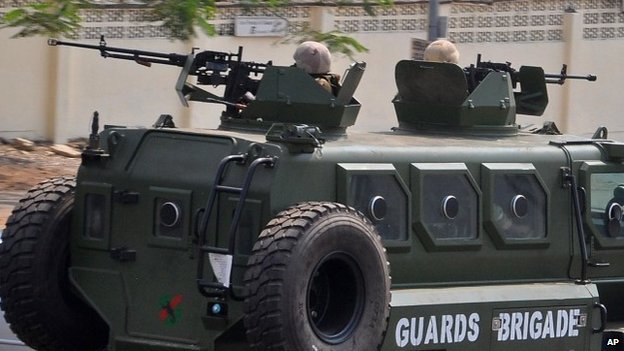The United Nations pledged on Wednesday to make its peace keeping platform available to Nigeria as it fights Boko Haram in the north eastern part of the country.
 The United Nations pledged on Wednesday to make its peace keeping platform available to Nigeria as it fights Boko Haram in the north eastern part of the country.
The United Nations pledged on Wednesday to make its peace keeping platform available to Nigeria as it fights Boko Haram in the north eastern part of the country.
Special Representative of the UN Secretary-General for Nigeria and West Africa, Ibn Chambas said that there would be a UN support through the Department of Peacekeeping to ensure that the different countries, who are contributing troops, all work as one and get their efforts towards degrading and eliminating Boko Haram.
Speaking to journalists after his meeting with President Goodluck Jonathan, Chambas said that Nigeria can count on the strong support of the United Nations.
"The Secretary General wishes to assure that in the area of humanitarian support with the displaced persons in Nigeria, we will continue to work with Nigerian authorities," he added, stressing that Boko Haram group is not a threat only to Nigeria or the region, but indeed is an international issue, and requires full international support in the same way the fight is taken against Al-Shabab, ISIL (Islamic State of Iraq and the Levant) and AQIM, in North Mali.
"We hope that through our joint efforts, we will be able to bring some respite to the lives of the people who have been internally displaced as a result of the barbaric and cruel action of Boko Haram."
In the meantime, Niger's parliament has voted to send troops to Nigeria to join the fight against the militant group.
The vote comes after Boko Haram attacked a prison and detonated a car bomb on Monday in the town of Diffa, near Niger's border with Nigeria.
MPs said parliament unanimously authorized deploying 750 soldiers with a regional force battling Boko Haram.
On Saturday Nigeria, Cameroon, Chad, Niger and Benin agreed to establish a 7,800-strong force to fight the group.
Boko Haram launched its first attacks in Niger last week, and has vowed to create an Islamic state.
The conflict forced a postponement of Nigeria's presidential and parliamentary elections from 14 February to 28 March.
At least 3.2 million people have been displaced by the insurgency, launched in north-eastern Nigeria in 2009, Nigerian officials say.